Xiangling and Guoba—An Impressive Chinese Tale
As a character who appears early in Genshin Impact, Travelers are surely not unfamiliar with Xiangling. Among them, there are certainly players who deeply adore Xiangling due to her personality or outstanding combat performance! Today, let us step into Xiangling's world and explore the etymological analysis related to her.
1. Xiangling Name Etymology
The name "Xiangling" corresponds to the Chinese characters "香菱." "香" (xiāng) originally refers to the pleasant aroma of food and grains, later extended to denote the fragrance of other objects, as well as things containing a sweet scent. In its extended meaning, "香" also signifies a person or thing being popular and well-received in society.
"菱" is an annual aquatic herb with slightly triangular leaves, air sacs on the petioles, white flowers blooming in summer, and hard-shelled, angular fruits that are edible.。

2. Guoba Name Etymology
Guoba refers to the layer of rice grains that becomes scorched and forms a crust when adhering closely to the pot during the cooking of traditional Chinese "claypot rice." Its main ingredients include rice, millet, soybeans, and cornmeal. It has the dietary effect of strengthening the digestive system and aiding digestion, but it is not suitable for those with weak stomachs, chronic gastritis, or poor appetite.

The name "Guoba" originated in Anhui; hence, its roots should be traced to Anhui. In an article titled "Origin of 'Guoba'" published in the Beijing Evening News on June 4, 1994, Mr. Li Zhiwen noted that "Guoba" was originally written as "锅粑", a term from the dialect of Anhui with strong regional characteristics. While savoring the crispy and fragrant Guoba, exploring its origin also reveals the modest contribution of Anhui people to both national cuisine and the lexicon.

3.Guoba: The Title "God of the Stove" and Its Cultural Roots
Guoba's title is "God of the Stove," corresponding to the Chinese "灶神" (Zàoshén). The Stove God is also known as "灶君司命". In ancient China, nearly every household's kitchen enshrined a "Stove God" altar. People revered this deity as the "Kitchen Lord of Fate," and legend states he was appointed by the Jade Emperor as the "Lord of the Eastern Kitchen, Controller of Fate, and Guardian of the Hearth," tasked with overseeing each family's hearth fire, thus earning worship.
Most Stove God altars were placed on the north or east wall of the kitchen, with the deity's image displayed in the center. Households without a formal altar often pasted the image directly onto the wall. Some depictions showed only the Stove God (灶王爷), while others featured both a male and female figure-the latter called "灶王奶奶" (Stove God's Wife). The Stove God is the most representative folk deity in Han Chinese culture, deeply rooted in popular belief, embodying the people's wishes to ward off misfortune and welcome prosperity.

Is the Stove God male or female? Ancient texts differ: Confucian scholars often described the deity as an old woman or a beautiful lady. Tang Dynasty scholar Li Xian, citing the Miscellaneous Five Elements Book, noted: "The Stove God is named Chan, styled Zigguo, wearing yellow robes, with disheveled hair emerging from the stove". Conversely, the Book of Honoring the Stove, likely from the Qing Dynasty, identified the deity as male: surnamed Zhang, given name Dan, styled Zigguo. Most folk altars depict the "Kitchen Lord of Eastern Abode Who Grants Blessings" as an elderly couple seated together or one man flanked by two women-reflecting the Stove God and his consort(s).

The in-game character Guoba, with its adorably clumsy appearance, skyrocketed to fame through a series of cute and funny emoji stickers, winning the hearts of countless fans. Its popularity continues to soar, spawning a variety of merchandise like plush Guoba Plush, and even becoming players' beloved real-life "foodie buddy."
4. Xiangling Constellation "Trulla"
Xiangling's constellation is "Trulla," which translates to Chinese as "长杓座". "长杓" refers to a long-handled ladle used for scooping, and its origin is linked to the renowned poem "Ode to the God of the Stove". The poem's final verse mentions the Stove God: "After the Kitchen God is well-fed and drunk, we send him to ascend the heavenly gate; we beg him not to speak of family troubles long or short, and pray for prosperity in the coming year to share upon his return."

4.1 Constellation Level 1: "Crispy Outside, Tender Inside"
"Crispy Outside, Tender Inside" describes food that is crispy on the outside and tender on the inside after cooking.
4.2 Constellation Level 2: "Oil Meets Fire"
Xiangling's second constellation name is "Oil Meets Fire," which translates to Chinese as "大火宽油". "大火宽油" refers to a cooking method where a very large amount of oil is poured into a wok and spread out, coating the inside of the wok with a thick layer of oil before being poured out. "宽" represents the wide surface area of the oil.
4.3 Constellation Level 3: "Deepfry"
Xiangling's third constellation name is "Deepfry," which translates to Chinese as "武火急烹". "武火" is a term for high-intensity heat used in cooking. In traditional Chinese medicine, it refers to boiling herbs with rapid, strong heat. Herbal decoctions often start with "武火" followed by "文火" (mild fire). Some herbs unsuitable for prolonged boiling, such as dispersing or aromatic herbs, are only heated with "武火."
4.4 Constellation Level 4: "Slowbake"
Xiangling's fourth constellation name is "Slowbake," which translates to Chinese as "文火慢煨". "煨" originally meant fire in a brazier. Today, it refers to a cooking method that uses ginger, scallions, and broth to infuse flavor and remove impurities from ingredients. In Northern Chinese cuisine, it also means simmering food in a sealed clay pot over mild heat.
5. Xiangling Combat Skills
5.1 Normal Attack-"Dough-Fu"

Xiangling's normal attack is named "Dough-Fu," which translates to Chinese as "白案功夫" (Bái'àn Gōngfū). In China, chefs are generally divided into two categories: "红案" (hóng'àn) and "白案" (bái'àn). Simply put, "白案" refers to chefs specializing in flour-based foods, while "红案" refers to chefs specializing in meat-based dishes.
"红案" is commonly called "hot dishes." It primarily covers the cooking of meat dishes and bowl-based dishes, including braised pork, crispy pork, honey-glazed pork, fermented pork, ribs, and other meats-encompassing techniques such as stir-frying, braising, pan-frying, quick-frying, stewing, boiling, deep-frying, simmering, poaching, and slow-cooking. This category is named "红案" because it relies on stoves and fire as fundamental tools.

"白案" is commonly called "pastry-making." It involves preparing rice cakes, noodles, and baked goods. This category is named "白案" due to its focus on rice, flour, and the pastry board. Within "白案," roles are further divided into "大案" (major tasks), "小案" (minor tasks, also called "主案"), and "面锅" (noodle-boiling). "大案" handles large-scale production of flour-based foods, including handmade noodles, dumpling wrappers, steamed buns, flower rolls, and dumplings. "小案" focuses on banquet desserts or custom pastries according to customer requests. "面锅" is mainly responsible for cooking noodles.
5.2 1st Ascension "Passive-"Crossfire"
"Crossfire" specifically refers to a situation where the angles of fire between teammates form a network of intersecting lines greater than 0°. The purpose of establishing crossfire is to force enemies to remain exposed to attacks from at least one direction, preventing them from effectively aiming, seeking cover, or scouting. This tactic ensures victory by overwhelming the enemy's defensive capabilities.

This article about Xiangling's cultural origins ends here. I wonder if you have learned something new from it. Of course, the Chinese cultural references hidden within the Liyue series of characters are truly fascinating! In the future, we will also bring you lore explorations of more characters. Please stay tuned for our articles and other Genshin Impact merchandise.












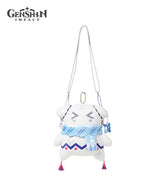

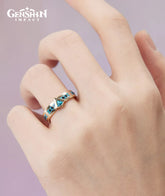

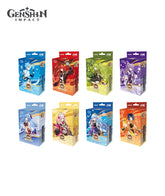
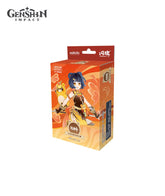
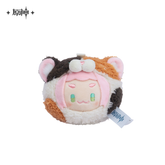
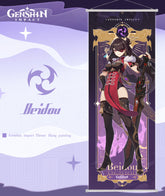
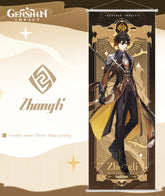



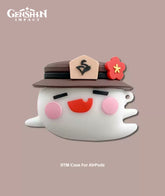
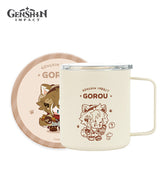
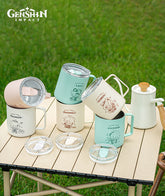
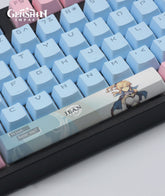
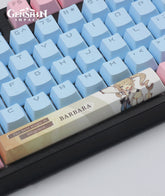
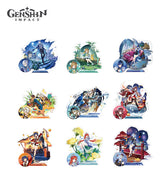

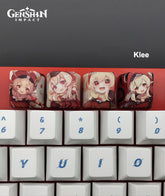
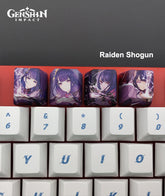
![[Official Merchandise] Genshin Impact Genius Invokation TCG Acrylic Phone Stand](http://genshinfans.com/cdn/shop/files/merch_165x.jpg?v=1714469221)
![[Official Merchandise] Genshin Impact Genius Invokation TCG Acrylic Phone Stand](http://genshinfans.com/cdn/shop/files/SKU-10_7899ff05-44a5-4cf4-bdc3-e9145de86ac9_165x.jpg?v=1714469221)
![[Official Merchandise] Chibi Character Metal Keychain Accessories](http://genshinfans.com/cdn/shop/products/25_b1b77f07-b390-4ceb-af6c-81fcb3b2eaa3_165x.jpg?v=1694509882)
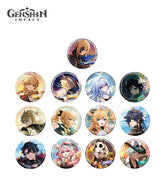
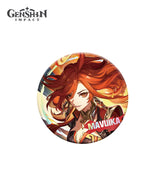
![[Official Merchandise] Chibi Character Fabric Badges](http://genshinfans.com/cdn/shop/products/11_ca2b6682-f281-48d3-aa2e-21c74dc70bdd_165x.jpg?v=1694515769)
![[Official Merchandise] Xiangling Merch: Guoba Plushie Pillow With Removable clothing](http://genshinfans.com/cdn/shop/files/ZT03_69d02d80-6cb9-419f-9a5f-a603a3243ecc_165x.jpg?v=1692848729)
![[Official Merchandise] Xiangling Merch: Guoba Plushie Pillow With Removable clothing](http://genshinfans.com/cdn/shop/files/ZT01_f3421204-7d63-4c6b-9d85-58584b8c614a_165x.jpg?v=1692848729)
![[Official Merchandise] Genshin Impact Liyue Character Day of Destiny Birthday Series Gift Box Set](http://genshinfans.com/cdn/shop/files/ZT01_b7e06cfe-d0d6-4b41-9abf-3d31a32d8c75_165x.jpg?v=1693550194)
![[Official Merchandise] Genshin Impact Liyue Character Day of Destiny Birthday Series Gift Box Set](http://genshinfans.com/cdn/shop/products/SKU-02-Xiao_165x.jpg?v=1693550546)
![[Official Merchandise] Genshin Impact Apple AirPods Pro Protective Case](http://genshinfans.com/cdn/shop/files/ZT02_b3cda9ba-4f34-4627-b252-fcdc3bb17992_165x.jpg?v=1692947166)
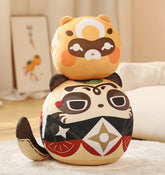
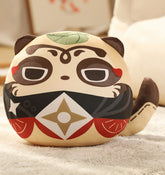
![[Official Merchandise] Xiangling Guoba Plush Coin Purse](http://genshinfans.com/cdn/shop/files/ZT01_a1c28f08-8e0d-45ea-abf6-8ed027385db1_165x.jpg?v=1700634099)
![[Official Merchandise] Xiangling Guoba Plush Coin Purse](http://genshinfans.com/cdn/shop/files/ZT02_a877eca1-6a1e-42a8-aab1-6c0f6ca3e837_165x.jpg?v=1700634099)


![[Official Merchandise] Genshin Impact Theme Character Badge Vol. 2](http://genshinfans.com/cdn/shop/files/SKU-13-KamisatoAyaka_165x.jpg?v=1697680757)